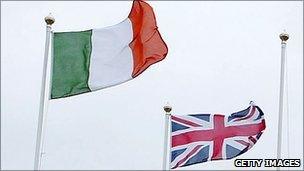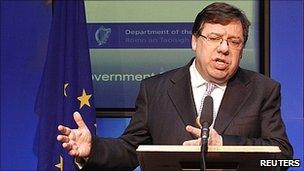Loan marks thaw in UK-Irish relations
- Published

Diplomatic ties remain strong as a result of the peace process
The UK has offered to make a direct bilateral loan to the Irish Republic - on top of contributing to EU and IMF loans.
One of the most striking political developments to emerge from the Republic's economic turmoil is how the country's age-old frostiness with Britain has completely thawed.
It was significant that during his darkest hour, the Irish prime minister went out of his way to thank his British counterpart for his support.
David Cameron was the first name that Brian Cowen mentioned on Sunday night as he acknowledged the support that the Dublin government had received as it sought financial aid.
Britain is offering the Republic of Ireland a direct loan, as well as making a contribution to the international funds to which the Dublin government will soon gain access.
Of course, the UK is not just being a good neighbour. It has its own interests to consider.
If the Irish economy implodes, the first place to be hit by the "shrapnel" will be the UK.
Chancellor George Osborne: "We want the Irish economy to be stable"
That was how British cabinet minister Ken Clarke put it on BBC Radio 5 live on Sunday evening.
Export market
The Northern Ireland economy would certainly be ducking for cover. It is estimated that around 40% of exports from the North go south.
Figures for the UK as a whole help explain why Britain is taking such a keen interest in the plight of its Irish neighbours.
The Anglo-Irish economic ties include:
The Irish Republic is the UK's fifth largest export market
Every man, woman and child in the Republic spends an average of £3,607 per year on British goods
The Republic is the UK's number one export market for the food and drink sectors
62 Irish companies are listed on the London Stock Exchange
More pressing is the credit exposure of British banks to Irish borrowers, amounting to more than £50bn
All of the above helps to explain why UK Chancellor George Osborne is being a good neighbour.
Rather than hiding behind the curtains and sniggering, he is preparing to dig into his pocket.
Given that the UK has had its own financial difficulties, some may find this surprising.
Indeed, when news of a possible British bail-out broke, one Dublin commentator likened it to two drunks staggering out of a pub and doing their best to keep each other upright.
There have been some raised eyebrows on the Tory backbenches in the House of Commons about the UK helping a member of the Eurozone.
Those murmurs of discontent may now re-emerge but it is unlikely to deflect Mr Osborne.
Although safeguarding Britain's economic interests is undoubtedly his priority, it would be wrong to dismiss the remarkable improvement in political relations with the Republic in recent years.
The peace process has transformed the relationship between London and Dublin. Although ministers have come and gone, civil servants and diplomats have kept up the ties.

Mr Cowen made a point of thanking David Cameron for his support
Given that Ireland fought a war for independence from Britain in the last century and the British Embassy in Dublin was burned down in 1972, the recent harmony in Anglo-Irish relations is remarkable.
Indeed, it is likely that the Queen will make her first visit to the Irish Republic next year, in what will be seen by many as the defining moment of the peace process.
Dublin cynics may ask her to bring her cheque-book with her.
The Queen's visit is unlikely to be until next summer. By then, the Republic is likely to have a healthier bank balance, thanks to its international friends.
It is also likely that by next summer, it will have a new prime minister.
Brian Cowen will this week launch his government's four-year recovery plan, but the truth is he will be lucky to survive in office another four months.
- Published29 November 2010
- Published22 November 2010
- Published22 November 2010